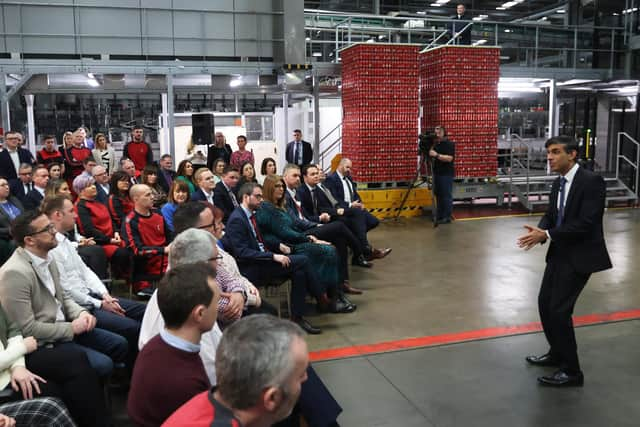Brexit: Rishi Sunak's 'Windsor Framework' deal with EU over Northern Ireland is a hopeful sign for future relations with Brussels – Christine Jardine
The picture became even more ridiculous when this arch-Brexiteer enthusiastically proclaimed the benefits Northern Ireland could derive from being in both the EU single market and the UK. Is that not what we all used to have?
Are what Rishi Sunak described with a smile as the “exciting prospects” for Northern Ireland not what we all used to take for granted? And yet even as the Tories basked in this self-proclaimed Brexit victory, there was just the slightest hint, a tiny glimmer of hope that our future relationship with the European Union might be salvageable.
Advertisement
Hide AdAdvertisement
Hide AdIs there a chance we may have turned the corner that so many of us have hoped for since 2016? There is no need now to remind us of the damage that Brexit Boris and his chums did, the obstacles that were created for our businesses and the inconvenience for everyone on a regular basis. We are all living with the consequences.
The reality remains that the Conservatives erected immense barriers to trade between the UK and the EU. Farmers, fishermen and small businesses across Britain remain tied up in red tape and the Conservative government are, as yet, doing nothing to help them. But in recognising the importance of creating a special agreement for Northern Ireland, they may, perhaps, have taken an important step towards reconciliation.
For too much of the recent past, our relationship with Europe was dominated by the childish antics of Boris Johnson and his discredited claims of oven-ready deals and unashamed willingness to break international agreements. Then came Liz Truss' reckless announcement as Foreign Secretary of the now abandoned protocol bill which would have overturned the treaty.
At times, the delicate peace underpinned by the Belfast Good Friday Agreement seemed more fragile than for years. And that ‘special relationship’ with the United States which we have cherished for a century or more was stretched further than ever before.
There will, I have no doubt, still be difficult times ahead – politics in Northern Ireland is never smooth, and the government needs to offer the region’s parties assurances about how the proposed Stormont brake will work. It is their opinion which matters.


However, most importantly, now we should see an end to the uncertainty which has hung over the province undermining its political and economic stability. Crucial will be a return of the devolved executive at Stormont so that it will be the people of Northern Ireland who will decide on the framework proposal.
But now that success seems within reach, I find it extraordinary that any UK Government should have been so cavalier in their attitude to a peace which was so hard won. The danger of undermining the Good Friday Agreement had been clearly signposted since the first days of the EU referendum campaign.
And that a Conservative and Unionist government should have ignored it to the point of creating a border down the Irish Sea with all the complications and questions that it raised, seems inconceivable. But the one thing that I have discovered over the years is that all politicians and parties have the ability to surprise, and often disappoint.
Advertisement
Hide AdAdvertisement
Hide AdSo it was at Westminster. When the overwhelming response on all sides was relief that there might be a way forward acceptable to the people of Northern Ireland while preserving the Good Friday Agreement, the SNP was determined to sing a different tune. They could not resist the temptation to try to leverage the plight of Northern Ireland for their own selfish ends when the Prime Minister was asked: “If there can be a very special status for the province of Northern Ireland, why can there not be a very special status for the nation of Scotland?”
The question seemed not only to miss the point but to be either blind to, or deliberately ignoring, the century of pain and struggle that Northern Ireland has endured to reach this point. Or the practical problems created by the fact that Northern Ireland is the only part of the United Kingdom that shares a land border with a country of the European Union.
Surely, this once, they could have made an effort to move beyond their narrow, myopic obsession to recognise the bigger picture and acknowledge there is something more important than separatism. Of course, we still have a long way to go before we can relax in the certainty that the Windsor Framework will succeed where the Northern Ireland Protocol failed.
The political parties in Northern Ireland must be given time and space to scrutinise the document, consult their community and reach their own conclusions. The immediate reaction may have been favourable, but we must see the process through to its successful enactment before we can be sure.
Similarly, we must work to ensure that this important progress for Northern Ireland also becomes a significant first step towards building a fresh bridge between the United Kingdom and the EU, consolidating the relationship which has taken on a new importance since the illegal invasion of Ukraine.
For once in these past seven years of division and disharmony over Europe, our parliament felt like it was moving towards a common goal, seeking consensus and willing to work together. We owe it to the people of Northern Ireland to ensure we do not let that slip again.
Christine Jardine is the Scottish Liberal Democrat MP for Edinburgh West
Comments
Want to join the conversation? Please or to comment on this article.